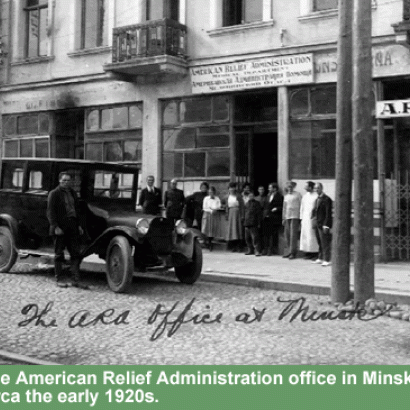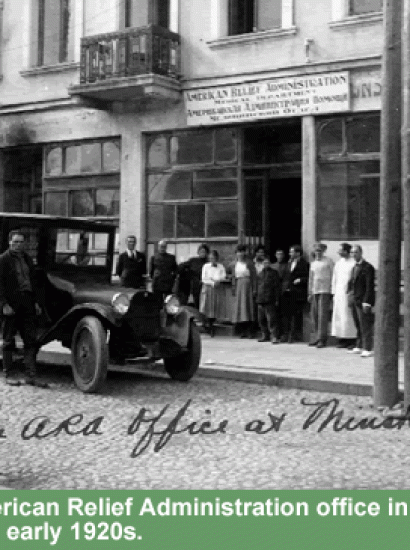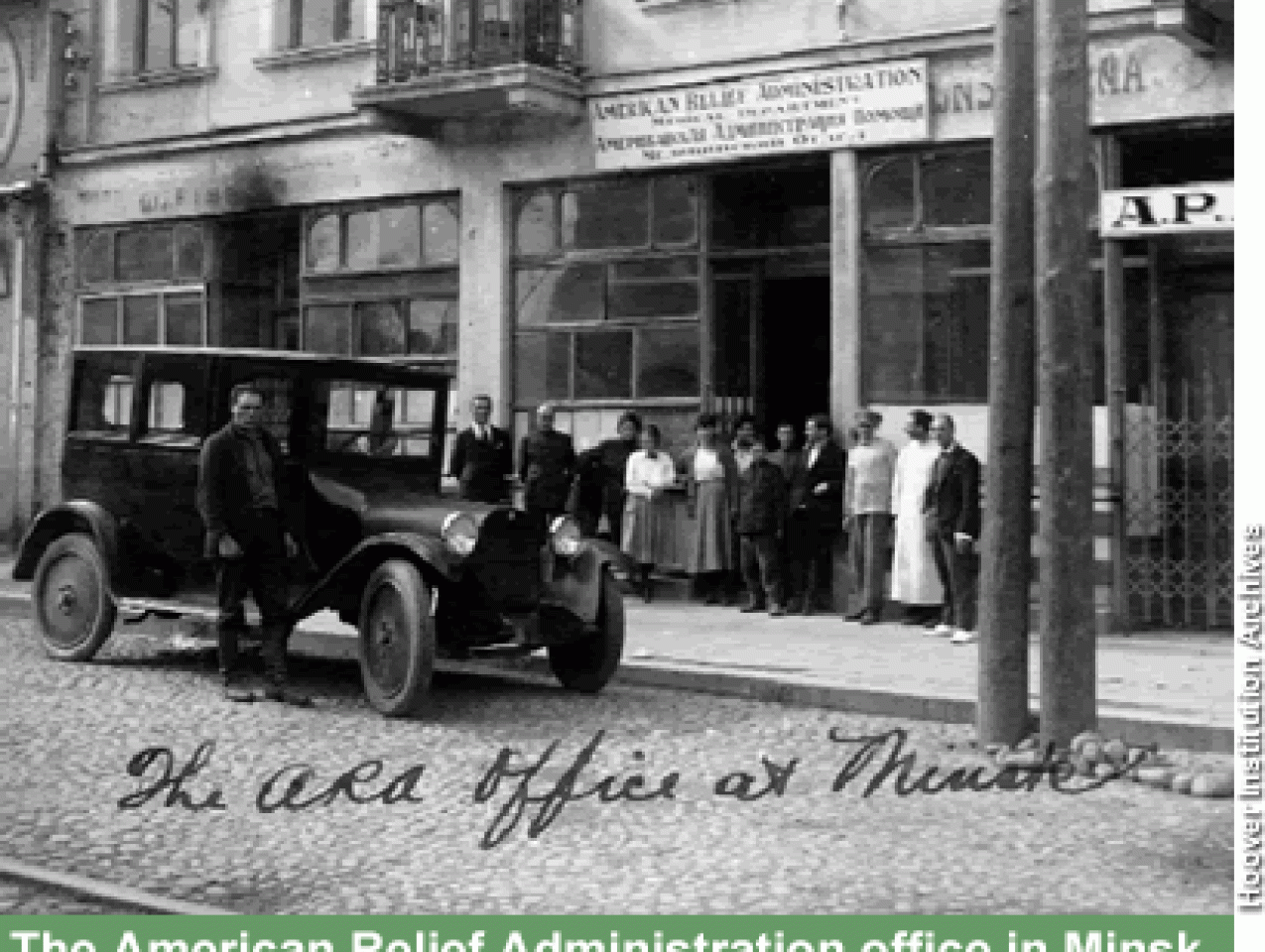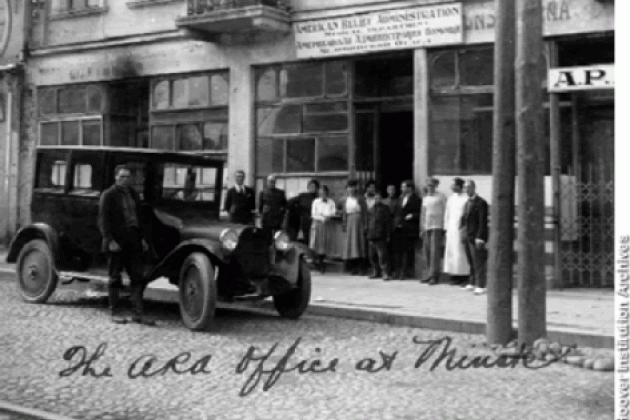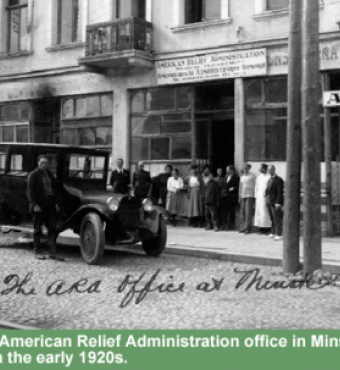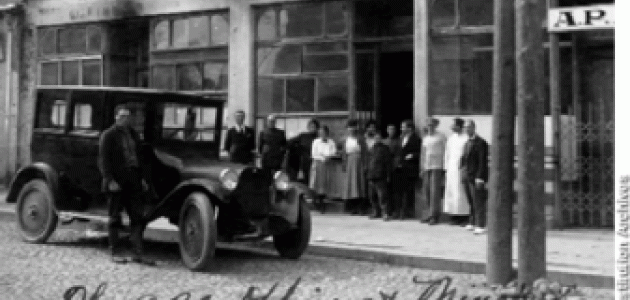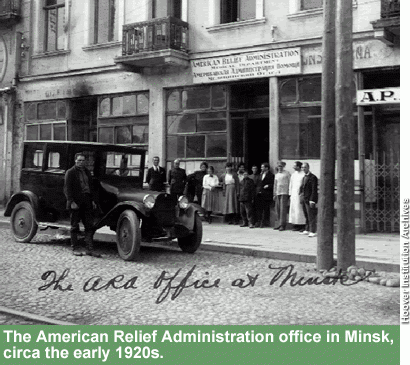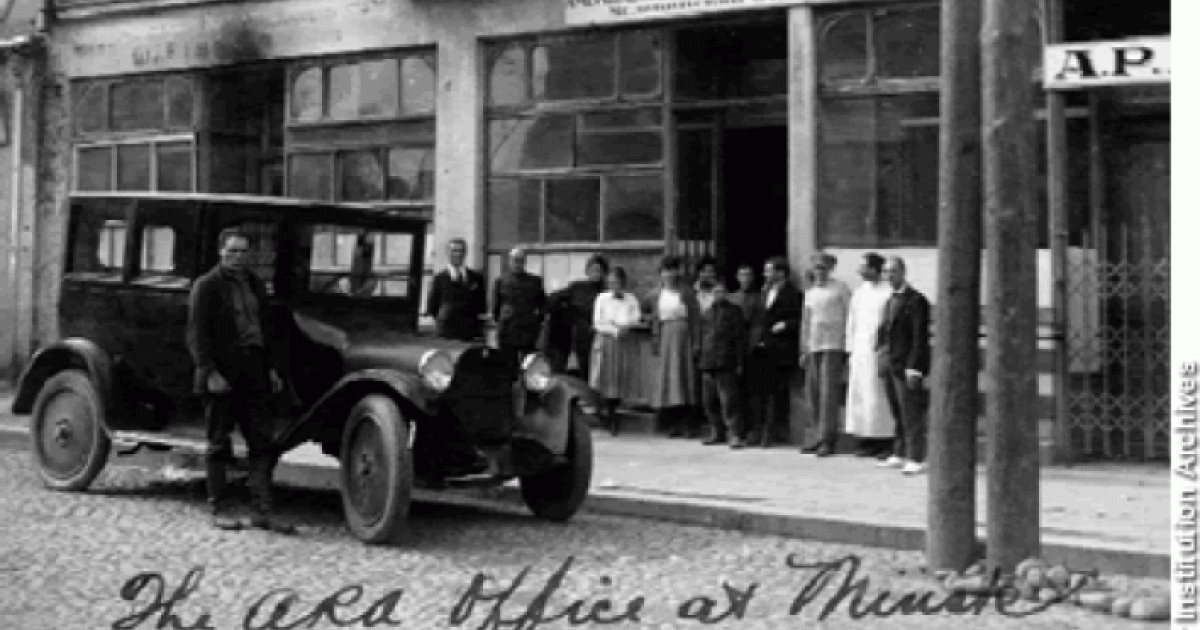- International Affairs
- US Foreign Policy
- Contemporary
- World
- History
February 1923 began well for the ARA in Minsk. District supervisor Charles Willoughby and physician Ralf Herz were accepting congratulations at the party thrown by the Belarus Red Cross to celebrate the opening of the university medical clinic. The ARA had provided most of the furnishings, and the Americans were guests of honor. In a letter to the ARA’s Moscow headquarters Willoughby wrote:
The speeches were short but many and, contrary to the general custom in White Russia, each speaker, in words of but few syllables, declared that without the assistance of the ARA, a majority of the children’s homes and hospitals of White Russia would be forced to close their doors—after ejecting their inmates. Commissars and ranking government officials as well as prominent teachers, doctors and scientists of the republic were present and voiced those sentiments in their speeches.
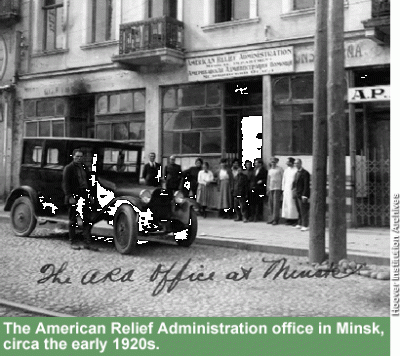
By the beginning of February, the clothing remittance program had been completed, but the amount of work in the Minsk office did not subside. After overseeing the January delivery of a record 61 railcars full of food and medical supplies, Americans continued to visit children’s homes and hospitals. Every two weeks Willoughby sent an operations report to his American superiors in Moscow. In addition to obligatory numbers and other ARA-related information, Willoughby enclosed such items as a local newspaper review of former U.S. senator Richard Pettigrew’s progressive book The Triumphant Plutocracy and a pamphlet by the “Belarus propaganda department” directed against Christmas trees and Santa Claus. In early February, he received a long letter of acknowledgment from ARA director William Haskell and ARA inspection-control division chief Philip Baldwin:
These semi-monthly documents are greeted by us with the satisfied “Aha!” that might emanate from the throat of a gentleman on Sunday morning—ensconced in his comfortable armchair, in dressing gown and bedroom slippers—as he greets his Sunday supplement. We expect to be interested and amused—and we are not disappointed. You certainly deserve much credit for the work you are putting into this material, and we assure you that credit will be given where credit is due. It’s great stuff.
Haskell and Baldwin approved several of Willoughby’s requests for additional relief and asked for more reports from Minsk inspectors.
The district supervisor was also urged to start looking for ways to make a long-term impact after the ARA’s withdrawal. Thus in Russia’s Samara the ARA helped restore a long-neglected public bathhouse; the positive repercussions of hygiene promotion in a typhus-ridden country could not be overestimated. In their letter, Haskell and Baldwin gave Willoughby a tip: “Friendly discussions with the local government representative on the ways this work might be accomplished—over a glass of vodka at the Personnel House—may reveal all manner of possibilities along this line.” Keeping people clean was also on the mind of Marian Stokovsky, the Belarus government representative. So much so that on February 21, Stokovsky wired the Soviet government plenipotentiary representative Karl Lander: “Let us know if we can insist on the checking and cleansing of ARA employees.”
Communist authorities conducted an annual campaign of government “cleansing”—vetting and eliminating all employees deemed politically disloyal. All workers were required to fill out special biographical forms describing their family background, property ownership, and employment history and submit to an oral political examination. A week later, Karl Lander wired his response: “No objections. Try to avoid incidents.”
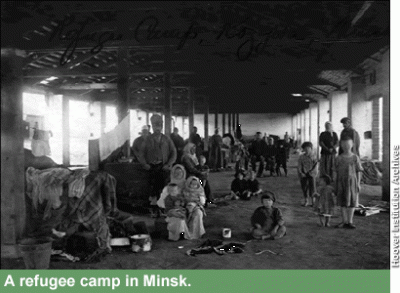
A hundred people worked in the ARA’s Minsk district—warehouse workers and drivers, bookkeepers and guards, inspectors and doctors—and none of them were Party members. According to the Riga Treaty, the ARA did not recognize Soviet trade unions and therefore refused to deal with union demands. If anybody believed, however, that the dictatorship of the proletariat ended at the ARA’s front door, they were mistaken.
Immediately on receiving Lander’s wire, Stokovsky wrote to Willoughby: “Pursuant to general instructions relating to the checking and cleansing of institutional employees—those of foreign organizations included—please be advised that a committee has been organized under my chairmanship for the evaluation of your employees. The committee will begin its work in the very near future.”
“Cleansing” was going on everywhere. Fifty-three of 105 employees at the Ministry of Finance failed the test and were consequently fired. When Willoughby inquired as to the exact meaning of the word “cleansing,” he was treated to the following exchange, which resulted in the firing of a finance ministry clerk:
“Where is Karl Marx?”
“He is dead.”
“You are wrong. Karl Marx is not dead. He lives in the heart of every true Communist. You’re fired!”
Once “cleansed,” an individual was barred from future government service and from significant posts of any kind—including those within the ARA.
On matters of ideological loyalty, the words and deeds of the authorities went hand in hand. In early February, Willoughby informed Moscow about an anti-religious campaign in Minsk: “Having already seized the Bishop’s residence and turned it into a museum, the young communists have now set their sights on Minsk’s historic Great Synagogue. Their plan is to convert it into a workers’ clubhouse, and then take over the other synagogues in the city.” Before the month was out, the Great Synagogue was no more.
At this same time an article attacking the ARA appeared in the national newspaper. Its author, Leonoff, leader of the local chapter of the Union of Soviet Employees, had a score to settle with Willoughby. The union had earlier conducted a charity bazaar and requested that Willoughby contribute a couple of food packages to the effort. The district supervisor demurred, explaining it was beyond his authority, as all packages had already been prepaid and marked for delivery to designated beneficiaries. Willoughby’s refusal was construed as revenge for the strike that the union had staged at the ARA the previous November.
Under the circumstances, ARA employees were getting nervous and began to stay after hours to brush up on their political literacy. Willoughby, however, still regarded the whole affair as amusing and ridiculous rather than threatening. He wrote to headquarters:
Those employees of the ARA who do not happen to remember off hand the first name of Lenin, where is Karl Marx now, the official definition of communism, and who cannot give a fairly complete digest of the constitution, are doing quite a bit of worrying since the word was sent out that they soon will be hauled before a board of examiners, and questioned as to their political beliefs, and their knowledge of matters politically communistic, tested.
Barely concealing his sarcasm, he went on, “We do not think the Government has the right to dismiss one of our employees because he doesn’t know whether Rosa Luxemburg was a natural or camouflaged blond.”
Willoughby wondered what the official ARA position on cleansing might be. Before he could obtain an answer, however, events in Minsk began to unfold precipitously. On March 7, the communist daily Zvezda published the following notice:
The Committee organized for the checking up of the personnel of all the foreign organizations for relief in Russia asks all citizens knowing something about all abuses during their work, plunder, bribe, and disloyalty to the Soviet Government, of the Russian personnel of the ARA, to advise about the same to the Committee. . . . The Committee guarantees full secrecy to the persons who deliver applications. No notice will be taken of anonymous complaints.
The notice came as a complete shock to Willoughby. Only the day before, he had a meeting with Stokovsky during which he sought the representative’s aid in securing a visa for his wife, who was planning a trip to Minsk. Stokovsky obliged, preparing a letter to the Soviet diplomatic attaché in Warsaw. Nothing was mentioned about the impending notice.
The whole thing was losing its humor for Willoughby. Requesting an urgent meeting with Stokovsky, Willoughby’s letter to Moscow bore little trace of his customary wit:
The Government’s explanation as to why the latter advertisement was inserted, failed to throw any real light on the matter, as far as we are concerned. The ARA employees are very much worried, especially over the “disloyalty to the Soviet Government” phrase. In the past, at every tilt between a Russian employee and a government official, the latter always has charged disloyalty to the Government, merely because the employee in carrying out our instructions, which were instructions from the Moscow ARA, was defending the interests of the ARA.
In his meeting with Willoughby, Stokovsky tried to appease him by promising that he would personally conduct the ARA cleansing. Willoughby thus wrote to headquarters that “Stokovsky is a communist—but also a clever and rather far-sighted individual who does not resort to the petty annoyances which many of the ‘Good Tovariches’ practice.”
“Good comrades” were ubiquitous wherever the ARA went. In February, Zvezda published a short report bearing the byline “Criminal Investigation Directorate.” The title of the piece, “For the Work,” was wrapped in ironic, inverted quotation marks:
Comrade A., a criminal investigation agent, was dispatched to oversee the unloading of medical supplies for the ARA medical department. Once the unloading was complete, the warehouse manager handed a piece of soap to an unknown rail worker—a transaction noticed by the agent. The warehouse manager did not enjoy being observed and began to whisper something in a foreign language to his assistant, while continuing to squint at the agent.
At the story’s conclusion, the agent is also given a cake of soap, which becomes “exhibit A” in a report on suspicious behavior. The criminal division warned, through the press, that future “gifts” of such nature would be handed over to the court.
The ARA’s version of the story was somewhat different. Willoughby explained:
Feeling chilled in the cold winter night, the secret service agent requested that the ARA warehouse manager offer him a few “grams of alcohol” to warm up. Instead, the manager presented the agent with a bar of soap and suggested he use it to “scrub that silly little idea out of your mind.” Dismayed and fearful that the warehouse manager might report him, the agent acted preemptively. He presented the bar of soap to the head of the secret service, claiming that the warehouse manager had offered it to him as a bribe. By this time, however, the manager had already reported the incident to the district physician. Three weeks later, the article appeared in Zvezda.
The little “soap opera” reflected a fundamental disagreement between the ARA and local authorities. The Americans insisted on complete control over the whole range of relief efforts, from unloading trains to the dishes on the table of the children’s home to the care package delivered directly into the hands of its intended recipient. Authorities regarded this approach as suspicious, ineffective, and undermining—and any point scored in the blame game counted.
The ARA’s strict control policies required a sizable workforce. Dozens were charged with such tasks as receiving and checking packages, unloading cars, delivering goods to warehouses, bookkeeping and expense reporting, fulfilling requests, and responding to complaints. Because all sorts of people were hired to fill those jobs, personnel problems sometimes arose. One such episode prompted Willoughby to write to Stokovsky:
It has been reported to me that Kuzelev, chauffeur for the ARA, took from the ARA garage this afternoon, one of the automobile trucks of the organization, without the permission of either myself or the garage manager. If this is true, it is a serious offense. I am requesting you to call upon criminal authorities to make an investigation immediately, and if Kuzelev was in charge of the truck, to have him arrested and brought to trial. Will you also request the criminal authorities to start an investigation as to who placed a quantity of emery sand in the motor of the Cadillac touring car, which was seriously damaged.
Kuzelev was fired a week later.
Such criminal behavior, however, had nothing to do with political cleansing. From the beginning, the ARA continuously stressed its equal opportunity approach to hiring. The Riga agreement stipulated that “in securing Russian and other personnel, the ARA shall have complete freedom as to selection . . . free from governmental or other interference.”
As ARA director William Haskell tried again and again to explain to the Soviet authorities: “In choosing our Russian employees, as in feeding of Russian children, we ask no questions as to race, creed, or political opinion, and we trust that the Soviet authorities will observe the same attitude toward them.” Local authorities and unions, however, held the opposite view.
On Saturday, March 17, Willoughby received a copy of a telegram from the office of the Belarus government representative: “On Monday, March 19, at 11:30, the Committee on checking employees will begin working in your organization in Minsk. You are requested to have lists of all your employees—in offices, warehouses, the medical department and others—prepared for me.” Willoughby did not see the original telegram, which contained the additional heading “Secret” and the name of another recipient: “Copy to the GPU’s Comrade Karejva.”
During the political cleansing campaign, delegates of the Belarusian Congress of Soviets adopted a special greeting to the newly renamed secret police, the GPU (formerly known as the Cheka): “Let the world bourgeoisie, social traitors of all colors and ranks claim that you are murderers and inhuman beasts! For us, the workers of Soviet Belarus, you are our favorite sons, the most devoted workers of the revolution!”
A firmly resolute Willoughby, however, was fully prepared to fight for his employees. In his next message to Moscow, he sternly informed headquarters of his position:
We are not going to dismiss any employee merely because he cannot pass a political examination. We would like to know what Moscow will do about it in the event that the government—after the employee has been expelled from the union—steps in and arrests him.
(No one knows how Willoughby’s employees fared on the exam questions concerning Mrs. Luxemburg’s natural hair color or Mr. Marx’s whereabouts. It is probable, however, that they were no more well informed about such things than are the present-day residents of the Minsk streets that still bear the names of revolutionary brunette Rosa and her compatriot Karl.)
There was no love lost between the ARA and the Minsk unions. As stipulated by the Riga agreement, the ARA conducted its business directly with the government and did not have to deal with the unions. Thus, the Minsk ARA refused to negotiate contracts with local unions, meaning that the numerous union demands fell on deaf ears. The unions retaliated, using a conflict between an ARA manager and a local driver to organize a one-day strike that shut down all operations. Not all employees supported the strike, however, and some insisted on continuing deliveries of relief supplies to hospitals and children’s homes.
Three months later, on the eve of his departure from Minsk for good, Willoughby typed his final letter to the government representative:
My dear Mr. Stokovsky:
Before finally departing from White Russia, I cannot fail to make one last request of you, not only from the standpoint of the District Supervisor, but from that of the individual who has endeavored to do certain things successfully here.
It is with connection with the so-called “Black List,” upon which the names of 9 of my ex-employees have been placed. The president of the Union, Leonoff, frankly admits that a majority of the persons are black listed because of their alleged friendship to me and to other Americans connected with the organization. He maintains that such friendship is against the principles of unionism, and that the employees should suffer in consequence.
This is very unfair, and I do not believe that any reasonable minded man who has the interests of unionism at heart, would assume such a stand. These employees, who were friendly to me, were friendly to the ARA, and to the Russian Government. The ARA was assisting the Russian Government, or it would not have been in here. Therefore, Mr. Leonoff’s contentions are erroneous.
I am asking you if you will take up the fight of these nine ex-employees, and do what you can toward clearing their names.
Willoughby read the answer to his letter a year later, in an article published by the New York Times in May 1924. The title was “Arrests of the ARA Employees.”








